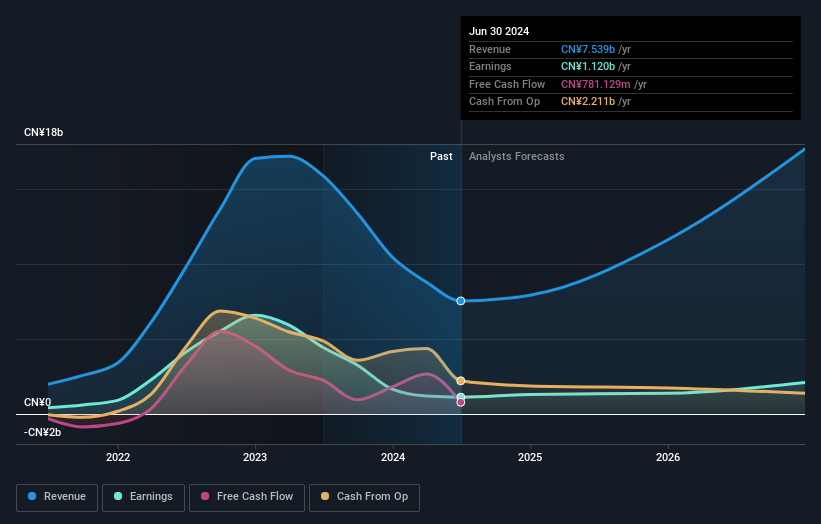Canmax Technologies Co., Ltd.'s (SZSE:300390) market cap dropped CN¥2.6b last week; Retail investors bore the brunt
Key Insights
- The considerable ownership by retail investors in Canmax Technologies indicates that they collectively have a greater say in management and business strategy
- 45% of the business is held by the top 25 shareholders
- Insiders own 34% of Canmax Technologies
Every investor in Canmax Technologies Co., Ltd. (SZSE:300390) should be aware of the most powerful shareholder groups. And the group that holds the biggest piece of the pie are retail investors with 52% ownership. That is, the group stands to benefit the most if the stock rises (or lose the most if there is a downturn).
Following a 12% decrease in the stock price last week, retail investors suffered the most losses, but insiders who own 34% stock also took a hit.
Let's delve deeper into each type of owner of Canmax Technologies, beginning with the chart below.
See our latest analysis for Canmax Technologies

What Does The Institutional Ownership Tell Us About Canmax Technologies?
Many institutions measure their performance against an index that approximates the local market. So they usually pay more attention to companies that are included in major indices.
As you can see, institutional investors have a fair amount of stake in Canmax Technologies. This can indicate that the company has a certain degree of credibility in the investment community. However, it is best to be wary of relying on the supposed validation that comes with institutional investors. They too, get it wrong sometimes. It is not uncommon to see a big share price drop if two large institutional investors try to sell out of a stock at the same time. So it is worth checking the past earnings trajectory of Canmax Technologies, (below). Of course, keep in mind that there are other factors to consider, too.

Canmax Technologies is not owned by hedge funds. Looking at our data, we can see that the largest shareholder is Zhenhua Pei with 24% of shares outstanding. With 8.1% and 1.5% of the shares outstanding respectively, Jianfen Rong and E Fund Management Co., Ltd. are the second and third largest shareholders.
On studying our ownership data, we found that 25 of the top shareholders collectively own less than 50% of the share register, implying that no single individual has a majority interest.
While it makes sense to study institutional ownership data for a company, it also makes sense to study analyst sentiments to know which way the wind is blowing. There is a little analyst coverage of the stock, but not much. So there is room for it to gain more coverage.
Insider Ownership Of Canmax Technologies
The definition of company insiders can be subjective and does vary between jurisdictions. Our data reflects individual insiders, capturing board members at the very least. Management ultimately answers to the board. However, it is not uncommon for managers to be executive board members, especially if they are a founder or the CEO.
Most consider insider ownership a positive because it can indicate the board is well aligned with other shareholders. However, on some occasions too much power is concentrated within this group.
Our most recent data indicates that insiders own a reasonable proportion of Canmax Technologies Co., Ltd.. It has a market capitalization of just CN¥18b, and insiders have CN¥6.2b worth of shares in their own names. That's quite significant. Most would say this shows a good degree of alignment with shareholders, especially in a company of this size. You can click here to see if those insiders have been buying or selling.
General Public Ownership
The general public, who are usually individual investors, hold a substantial 52% stake in Canmax Technologies, suggesting it is a fairly popular stock. This level of ownership gives investors from the wider public some power to sway key policy decisions such as board composition, executive compensation, and the dividend payout ratio.
Next Steps:
It's always worth thinking about the different groups who own shares in a company. But to understand Canmax Technologies better, we need to consider many other factors. To that end, you should learn about the 4 warning signs we've spotted with Canmax Technologies (including 1 which can't be ignored) .
But ultimately it is the future, not the past, that will determine how well the owners of this business will do. Therefore we think it advisable to take a look at this free report showing whether analysts are predicting a brighter future.
NB: Figures in this article are calculated using data from the last twelve months, which refer to the 12-month period ending on the last date of the month the financial statement is dated. This may not be consistent with full year annual report figures.
Have feedback on this article? Concerned about the content? Get in touch with us directly. Alternatively, email editorial-team (at) simplywallst.com.
This article by Simply Wall St is general in nature. We provide commentary based on historical data and analyst forecasts only using an unbiased methodology and our articles are not intended to be financial advice. It does not constitute a recommendation to buy or sell any stock, and does not take account of your objectives, or your financial situation. We aim to bring you long-term focused analysis driven by fundamental data. Note that our analysis may not factor in the latest price-sensitive company announcements or qualitative material. Simply Wall St has no position in any stocks mentioned.
 Index Options
Index Options CME Group
CME Group Nasdaq
Nasdaq Cboe
Cboe TradingView
TradingView Wall Street Journal
Wall Street Journal